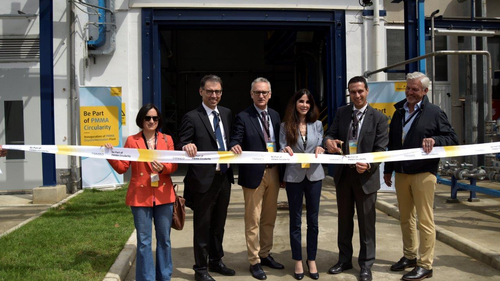Trinseo Opens its Next-Gen polymethyl methacrylate (PMMA) depolymerization facility in Rho, Italy
WAYNE, Pa.--(BUSINESS WIRE)-- Trinseo (NYSE: TSE), a specialty material solutions provider, announced today the opening of its polymethyl methacrylate (PMMA) depolymerization facility in Rho, Italy, on June 25. The pilot facility represents a significant step forward in the Company’s commitment to sustainability, as the next-generation recycling technology helps advance a circular infrastructure for acrylic solutions and is aligned with Trinseo’s 2030 Sustainable Product Portfolio Goals.
“We are thrilled about the opening of our depolymerization facility, which will help advance our goal to support a circular economy,” said Francesca Reverberi, Senior Vice President of Engineered Materials and Chief Sustainability Officer at Trinseo. “Our company remains committed to our sustainability goals, including investing in new recycling technologies that can support our customers in reaching their sustainability goals as well.”
Depolymerization is a chemical recycling process that returns acrylic solutions to the constituent monomer, methyl methacrylate (MMA). Complementary to other recycling technologies, depolymerization helps close the loop for acrylic recycling with several advantages over traditional processes. By utilizing this technology, acrylic solutions can be recycled—including PMMA sheets, which previously could not be mechanically recycled. Additionally, returning the material to its monomer form allows additives and contaminants to be removed from pre- and post-consumer acrylic products. This enables more PMMA to be recycled.
Trinseo’s PMMA depolymerization facility delivers a next-generation technology, utilizing an advanced continuous process to produce high-purity regenerated MMA from pre- and post-consumer acrylic solutions. Trinseo’s depolymerization technology leverages findings from the MMAtwo Consortium, a collaborative initiative funded by the European Union’s Horizon 2020 research and innovation program, to develop a new value chain for pre- and post-consumer PMMA and a versatile recycling process for converting this waste into high-quality regenerated monomer with carbon footprint reduction versus virgin MMA.
“Today is a critical milestone in our sustainability journey,” said Han Hendriks, Chief Technology Officer at Trinseo. “Depolymerization expands our recycled feedstock capabilities, which in turn, will help us innovate new solutions. With this new capability, we can build a more robust recycled acrylics portfolio to better meet the evolving needs of our customers.”
The recycled MMA (rMMA) generated by Trinseo’s depolymerization facility is utilized in the Company’s ALTUGLAS™ and PLEXIGLAS® R-Life product portfolios. Through this new facility, Trinseo can produce rMMA that is comparable to virgin raw materials. This enables use in high-demand applications, such as vehicle taillights or caravan windows that require high optical quality.
Categories
Countries
Companies
Latest news
UPM receives triple sustainability certification for the Leuna biorefinery
Leuna Chemical Complex →The Leuna biorefinery is the world’s first industrial-scale facility of its kind, converting wood into advanced biochemicals at scale. This milestone reinforces UPM’s role as a frontrunner in susta...
On stream: BASF starts up new world-scale plant for hexamethylenediamine in Chalampé, France
Increase of BASF’s HMD production capacity to 260,000 metric tons Expansion of polyamide business together with polyamide 6.6 production in Freiburg
BASF starts commercial operation of Black Mass plant for Battery Recycling in Schwarzheide, Germany
It is one of the biggest commercial Black Mass plants in Europe, with an annual processing capacity of up to 15,000 tons of end-of-life lithium-ion batteries and production scrap. This equals rough...
Clariant's ShiftMax™ 100 RE catalyst powers INERATEC´s groundbreaking e-Fuels plant at Frankfurt Höchst
Industriepark Höchst →Clariant supplies its innovative ShiftMax 100 RE catalyst for INERATEC's first commercial-scale e-Fuels plant in Industry Park Hoechst, Germany. The catalyst enables efficient conversion of green h...

